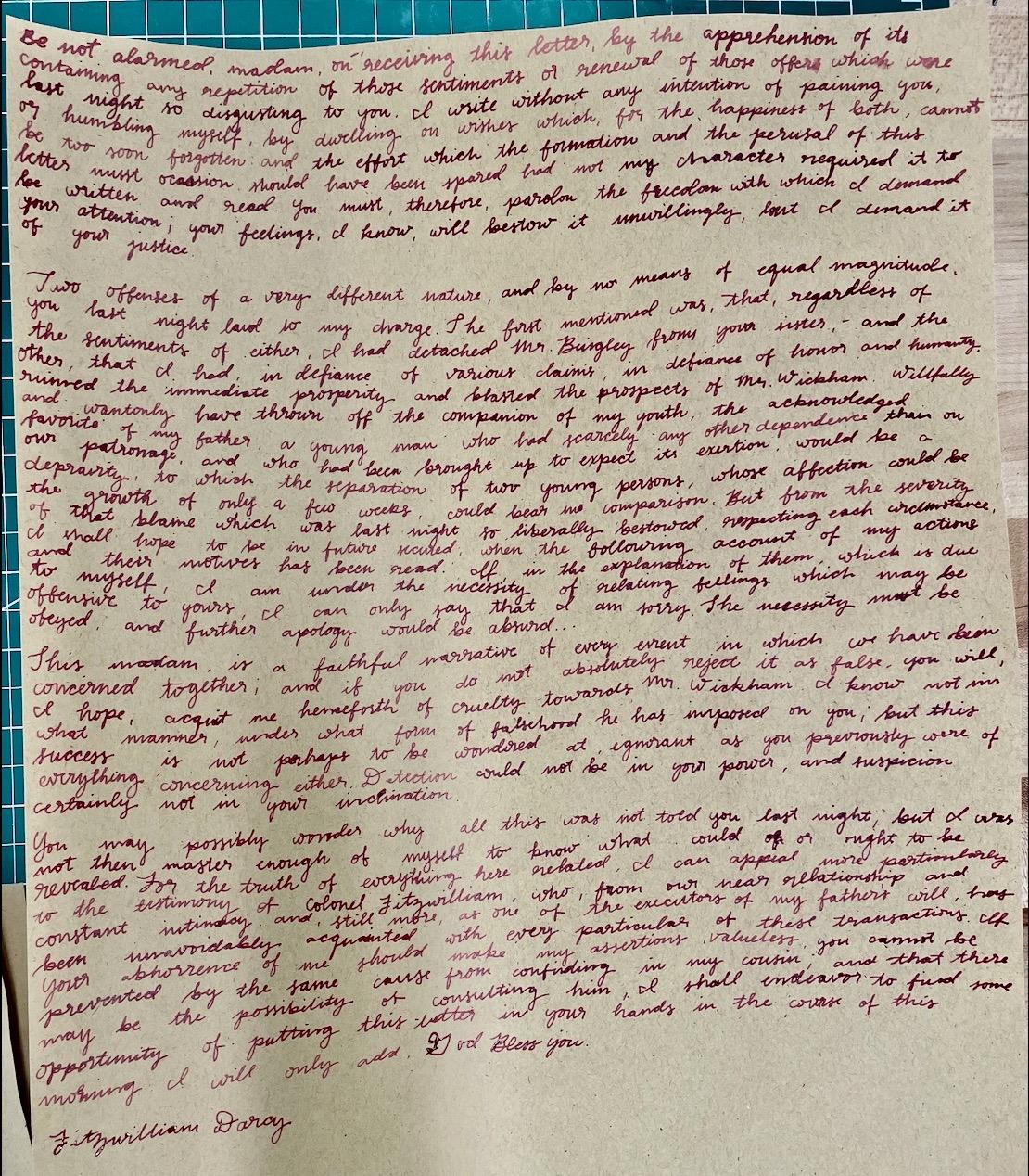In Pride and Prejudice, Elizabeth callously rejects Mr. Darcy after coming to believe a quite negative account of his character throughout the novel up to that point. He learns of her presumptions about him during her refusal of his offer and decides to write a lengthy letter to explain the truth of what happened between him and Mr. Wickham as well as his influence with Mr. Bingley. More specifically, Austen spells out Elizabeth's emotional journey after the heroine reads Darcy's explanation: "When this subject was succeeded by his account of Mr. Wickham, when she read with somewhat clearer attention, a relation of events, which, if true, must overthrow every cherished opinion of his worth, and which bore so alarming an affinity to his own history of himself, her feelings were yet more acutely painful and more difficult of definition” (177). This letter causes Elizabeth to reevaluate her beliefs about Mr. Darcy; it is the catalyst for her altered opinion of him and the beginning of her affection for the gentleman.
Recreation of Darcy's Letter to Elizabeth Bennet Following Her Refusal of an Offer of Marriage, crafted by Bridget Keeler, 2023. The first image in this exhibit displays the recreation I executed of Mr. Darcy's letter to Elizabeth Bennet. As that letter is quite lengthy, I shortened it by skipping over the middle of the letter where Darcy explains the stories of what actually happened between him and Wickham as well as his involvement in breaking apart Jane and Bingley. Still, Austen's writing brilliantly conveys Darcy's wit, devastation, and affection for Elizabeth in the opening and closing paragraphs. I had some minor spelling mistakes in my version, such as "ocassion" instead of "occasion" in the first paragraph.
Image of "Jane Austen" students drafting their letters, 2023. Our class traveled to the IdeaLab to work on these projects together. The second image in this gallery shows my classmates and me working on our letters. When I was younger, I got really into calligraphy and fountain pens, so I did not need to practice my cursive that much. However, I struggled to prevent blotches when using the dip pens and realized my choice to wear a white shirt was misguided. In the end, my practice paid off, in my opinion, as I didn't have any blotches and didn't ruin any of my clothes.
Recreation of Darcy's Letter to Elizabeth Bennet, folded and addressed, crafted by Bridget Keeler, 2023. Darcy gives his letter to Elizabeth face-to-face, in a hurried manner, due to the faux pas of unmarried men and women sending mail to each other as well as the humiliation of her rejection of his proposal. Using this knowledge, I opted not to seal my letter, although still folded it in the style of the 1800s. The seal felt superfluous, as there would be no need for the privacy a seal ensured since Darcy hand-delivered the letter. This image conveys the importance Darcy felt in getting the letter to Elizabeth as soon as possible, while also still showing the formality that society demanded of gentility at the time. In my rendition, Darcy addresses the letter to Miss Elizabeth Bennett, conveying his respect.
Film Still of Darcy, portrayed by Matthew Macfadyen, delivering his letter to Elizabeth Bennet, portrayed by Kiera Knightley, Pride and Prejudice 2005 version, directed by Joe Wright. In this scene, Darcy bestows his letter upon Elizabeth Bennet after rushing into the Collins's home (where she is staying) unannounced. After Elizabeth accepts the letter, Darcy leaves as quickly as he enters, and she begins to read. Elizabeth experiences many emotions as her views of Darcy, Bingley, and Wickham shift greatly due to Darcy's testimony about their characters. In both the novel and film, this letter serves as a turning point in the plot. Notably, in this portrayal, the letter Darcy hands to Elizabeth remains unaddressed and unsealed, similar to my own letter. That being said, not everything in the movie was completely accurate to the time period, so this may have been an oversight by the props department, rather than an intentional choice.




